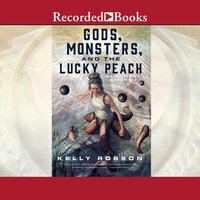Take a photo of a barcode or cover
I thoroughly enjoyed the concept of this, and the beginning was incredibly promising in the world-building, characterization, and plot. The quote to start off the novella about he past being a country and colonizing it set the stage, in my opinion. The story sagged for me once the team arrived in the past, though, and then the story just ended abruptly. I hope that Kelly Robson plans on writing a full-length novella to explore the setting, if not necessarily the characters (though that would be nice, too) more thoroughly.
This was the wildly inventive stuff that is why I started reading SF for. Also it's Canadian. Or, mostly set there, which I guess makes me kindly disposed toward it because of completely unrelated authors who had nothing to do with it (i.e., [a:Tanya Huff|1967|Tanya Huff|https://images.gr-assets.com/authors/1207242126p2/1967.jpg] and [a:Charles deLint|16360968|Charles deLint|https://s.gr-assets.com/assets/nophoto/user/u_50x66-632230dc9882b4352d753eedf9396530.png]).
In any case. A touch of post-apocalyptic, some generational struggle (which is feeling real these days, I must be getting old), time travel, and some smarmy guy from corporate. Every part of it is great, and it mixes well. This was another one I devoured pretty quickly (ok partially due to stress insomnia, but also it kept me hooked)
In any case. A touch of post-apocalyptic, some generational struggle (which is feeling real these days, I must be getting old), time travel, and some smarmy guy from corporate. Every part of it is great, and it mixes well. This was another one I devoured pretty quickly (ok partially due to stress insomnia, but also it kept me hooked)
Not a single word is wasted in this 227-page book. Nearly every sentence drives the narrative forward while nuggets of expository detail are spread throughout like chocolate chips in a perfectly balanced sweet bread. There were several ways this story could have collapsed under its own weight, and Robson avoided every one of them.
Time traveling environmental restoration scientists get into a bit of a pickle when they head back to ancient Ur on the banks of the Tigris and Euphrates rivers. I loved the worldbuilding and the clash of cultures, both ancient and futuristic. The future world, devastated by pollution and warfare, also has its own generation clash, with the plague babies and the fat babies (love the names!)
As a plague baby, octogenarian Minh has her legs modded out into six tentacles that act as her new legs. She, and the other humans, can control their body's endocrine systems by dialing up or down hormone levels to regulate homeostasis. Send these scientists back to the past, and they become gods, or monsters, or both.
The cover artist really does a great job in capturing Minh and the hovering camera bots. Excellent story!
As a plague baby, octogenarian Minh has her legs modded out into six tentacles that act as her new legs. She, and the other humans, can control their body's endocrine systems by dialing up or down hormone levels to regulate homeostasis. Send these scientists back to the past, and they become gods, or monsters, or both.
The cover artist really does a great job in capturing Minh and the hovering camera bots. Excellent story!
adventurous
emotional
mysterious
reflective
tense
Really enjoyed this one for all the normal good reasons (good writing, imaginative and consistent world, believable and interesting characters, etc) but for a quirky reason as well -the main characters initially compete to win a NGO RFP (think government contract) and having been part of that world myself the whole process really sang to me and made me smile in chagrin at the antics. This felt like a short read to me: Amazon says it was 233 pages, but it felt like 80 pages to me so I must have really blown through it. You don't have to be a contracts specialist to appreciate this one though, that little bit of story set up was just a hook that caught me early. This is a great novella/novel and worth reading, especially if you are interested in possible post climate change societies.
The first half is tiresome academic squabble and pointless philosophical debate. The second half is self-serving and philosophical without meaning or impact. The villain is obvious and uninteresting. There's some fun nonlinear elements and character design, but nothing that makes up for an ending that feels like the author just stopped writing rather than resolving anything.
adventurous
tense
fast-paced
Plot or Character Driven:
Character
Strong character development:
Complicated
Loveable characters:
Yes
Diverse cast of characters:
Yes
Flaws of characters a main focus:
No
There is some really cool stuff here, but the world-building didn't match the plot and the story felt incomplete to me. I really enjoyed learning about the world that the author started creating in the first half of the book, and it's clearly one she's spent a lot of time on. However, I also found this world-building frustrating because a lot of it is only minimally relevant to the plot and many things are mentioned in passing but never elaborated on or explained.
I did enjoy the way the book was structured, but the plot that was meant to rest on this structure lacked a strong narrative arc and momentum. And then it just ended, cutting off what could have actually been some of the most interesting parts of the story.
I did enjoy the way the book was structured, but the plot that was meant to rest on this structure lacked a strong narrative arc and momentum. And then it just ended, cutting off what could have actually been some of the most interesting parts of the story.






